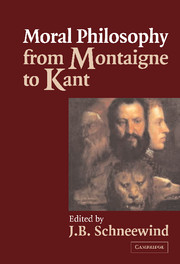Book contents
- Frontmatter
- Contents
- Preface
- Acknowledgments
- Foreword to the One-Volume Reprint
- Introduction
- PROLEGOMENA: SOME QUESTIONS RAISED
- PART I REWORKING NATURAL LAW
- PART II INTELLECT AND MORALITY
- PART III EPICUREANS AND EGOISTS
- Pierre Gassendi
- Pierre Nicole
- Bernard Mandeville
- John Gay
- Claude Adrien Helvétius
- Paul Henri Thiry, Baron d'Holbach
- William Paley
- Jeremy Bentham
- PART IV AUTONOMY AND RESPONSIBILITY
- Supplemental Bibliography
Claude Adrien Helvétius
Published online by Cambridge University Press: 05 June 2012
- Frontmatter
- Contents
- Preface
- Acknowledgments
- Foreword to the One-Volume Reprint
- Introduction
- PROLEGOMENA: SOME QUESTIONS RAISED
- PART I REWORKING NATURAL LAW
- PART II INTELLECT AND MORALITY
- PART III EPICUREANS AND EGOISTS
- Pierre Gassendi
- Pierre Nicole
- Bernard Mandeville
- John Gay
- Claude Adrien Helvétius
- Paul Henri Thiry, Baron d'Holbach
- William Paley
- Jeremy Bentham
- PART IV AUTONOMY AND RESPONSIBILITY
- Supplemental Bibliography
Summary
Introduction
Helvétius was born in 1715 into a family of physicians. His grandfather had become wealthy through a Parisian practice, and his father had treated Louis XIV and Louis XV and was physician to the queen. In 1738 family connections enabled Helvétius to obtain a lucrative post as tax collector. He acquired a small fortune within a decade and thereupon retired to devote himself to writing and to companionship with the advanced intellectuals of the day. From about 1750 until 1757 he worked painstakingly on De l'Esprit (On the Mind), which was published in 1758. The book caused a storm of criticism. Personal, philosophical, religious, and political attacks were launched against Helvétius, and it was only thanks to his official and family connections that he escaped prison or worse. He thought for a time of abandoning his writing, but returned to it after a while, eventually completing a second work, De l'Homme (On Man), which was published in 1772, a year after his death.
On the Mind is divided into four sections: the first lays out a general psychology and epistemology; the second concerns ethics and politics; the third explains Helvétius's ideas on education; and the final section offers a miscellany of thoughts, largely about aesthetics.
In his psychology, which he learned from a number of French contemporaries who drew much of their inspiration from Locke, Helvétius held that all our ideas come from bodily sensations. Judgment, or combining of ideas, is the act of comparing remembered sensations; the emotions spring from our reactions of pleasure or pain to what we perceive or think.
- Type
- Chapter
- Information
- Moral Philosophy from Montaigne to Kant , pp. 414 - 430Publisher: Cambridge University PressPrint publication year: 2002

